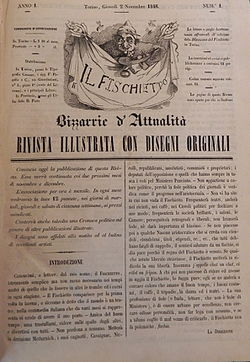Il Fischietto (Italian: The Whistle) was a political satire magazine published in Turin between 1848 and 1916. It was among the most important Italian satirical magazines of its time.[1] Its subtitle was Bizzarrie d'attuale - Rivista illustrata con disegni originali.[1]
 | |
| Categories | Satirical magazine |
|---|---|
| Founder |
|
| Founded | 1848 |
| First issue | 2 November 1848 |
| Final issue | 1916 |
| Country | Kingdom of Italy |
| Based in | Turin |
| Language | Italian |
History and profile
editIl Fischietto was established by Giuseppe Cassone and Lorenzo Pedrone in Turin in 1848.[1][2][3] Its first issue appeared on 2 November that year.[1] Picchetti Pietro served as its director,[2] and Francesco Redenti was one of its editors.[4] The magazine came out three times per week until 1905 when its frequency was switched to biweekly.[2] It was redesigned as a weekly in 1914.[2]
The magazine covered political satire[2] and supported civil liberties, freedom of speech and freedom of the press.[1] Casimiro Teja was among the notable contributors of Il Fischietto.[4] It targeted different groups, including government ministers, and had a liberal and anti-clerical political stance.[4][5] It generally supported the politicians Giuseppe Garibaldi, Bettino Ricasoli and Cavour.[4]
Its circulation was about 3,000 copies in the 1850s, but the magazine enjoyed higher levels of readership in the 1860s.[4]
References
edit- ^ a b c d e f "Unknown - Il Fischietto (the Whistle) Original Lithograph - 1863". pamono.eu. Retrieved 15 May 2023.
- ^ a b c d e f "Il Fischietto". periodicipiemonte.it. Retrieved 15 May 2023.
- ^ Luca Cottini (Fall 2017). "Palazzeschi's "La passeggiata" and the Urban Miniatures of the Modern World". Italica. 94 (3): 509. JSTOR 44983604.
- ^ a b c d e Niall Whelehan (April 2015). "Revolting Peasants: Southern Italy, Ireland, and Cartoons in Comparative Perspective, 1860–1882". International Review of Social History. 60 (1): 7. doi:10.1017/S0020859015000024. JSTOR 26394721.
- ^ Enrico Baroncini (2017). "Charivari and the 1876 Italian Elections". In Ilaria Favretto; Xabier Itçaina (eds.). Protest, Popular Culture and Tradition in Modern and Contemporary Western Europe. London: Palgrave Macmillan. p. 53. doi:10.1057/978-1-137-50737-2_3. ISBN 978-1-137-50737-2.